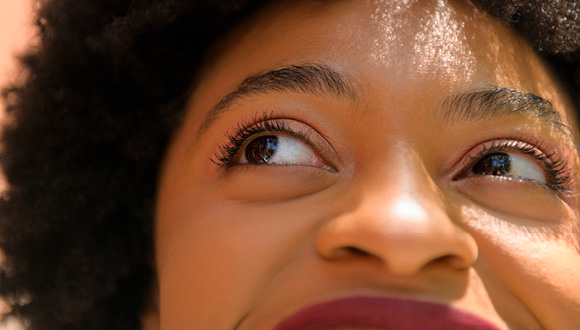As one of the most precious of your five senses, it's easy to see how important your vision is to you. (See what I did there?)
But how much do you really know about your eyes and how to keep them healthy?
"Your vision plays a huge role in your day-to-day life. And with masks now displaying our eyes more prominently than ever before, it's the perfect time to talk about the importance of keeping up with your eye health," says Dr. Amina Malik, oculoplastic surgeon at Houston Methodist.
Whether your vision is a perfect 20/20 or you rely on contacts or glasses to get you there, here are three tips for keeping up with your eye health and protecting your vision.
Give your eyes a rest
Whether you're sitting, standing, walking or talking, you use your eyes every waking hour of the day. And, while staring at a computer screen, driving long distances or reading, you really use them.
"Eyestrain occurs when your eyes become tired from intense use," explains Dr. Malik. "Eyestrain won't cause damage, but it can come along with some uncomfortable symptoms, so it's important to know how and when to give your eyes a rest."
The symptoms of eyestrain include:
- A burning or itching sensation in your eyes
- Dry or watery eyes
- Blurry vision
- Headache
- Sore neck or shoulder muscles
- Sensitivity to light
"Sleep is certainly a time when your eyes can get some rest, but there's more to resting your eyes than just shutting them," adds Dr. Malik.
For starters, if you're doing computer work, Dr. Malik recommends following the 20-20-20 rule — every 20 minutes, take a break and look at something 20 feet away for 20 seconds. This is because the bright light and/or glare from a digital screen can tire your eyes if you're viewing one for an extended period of time.
"Other common causes of fatigued eyes are straining to see in the dark, such as when reading at night, and relying on poor, uncorrected vision," adds Dr. Malik. "Adjusting light when possible and wearing corrective lenses can help relieve these causes of eye strain."
Lastly, if your eyes are strained because they're dry — whether that's due to the air quality outdoors or airflow indoors — lubricant eye drops (also called artificial tears) can help moisten and soothe your eyes."
Protect your eyes from the elements
Your eyes are not only delicate, they're fairly exposed — protected by only thin layers of skin (aka, your eyelids). And while having an eyelash stuck in your eye is merely uncomfortable, other things that can enter your eyes can cause real damage.
"From UV rays and particles in the air to chemicals and bacteria, many things can harm your eyes" says Dr. Malik. "Particles, chemicals and bacteria can cause irritation, inflammation and abrasions in your eyes, and exposure to UV rays has been linked to several eye diseases, including macular degeneration."
Here's what Dr. Malik recommends when it comes to keeping your eyes safe from harmful elements:
- Buy sunglasses that block UVA and UVB rays. Not all sunglasses are created equal — especially if you bought them for $10 at the gas station. To keep your eyes healthy, invest in a pair of sunglasses that blocks 99% of UVA and UVB rays. Wear them anytime you're outside, even if it's overcast. Proper sunglasses not only protect your eyes, but they also protect your eyelid skin from sun damage and potential skin cancer.
- Wear safety glasses or goggles. Protective eyewear is a must while working with particulate matter that can blow or hang in the air — such as at a construction site, or at a chemical plant or laboratory, where irritating chemicals can splash into your eyes or become aerosolized. In addition, protective eyewear can help prevent eye injuries while playing contact sports.
- Know how to prevent eye infections. To help prevent eye infections, avoid excessively touching your eyes, especially when your hands are unwashed. In addition, if you wear contact lenses, always wash your hands before applying or removing your lenses. And be sure to properly disinfect them between usages.
Know when to see an ophthalmologist
Even if you don't have poor vision, seeing an eye specialist every few years is an important component of maintaining your eye health.
You may be wondering which vision problems, disorders or diseases warrant seeing an ophthalmologist.
"As ophthalmologists, we are not only well-versed in the diagnosis and management of the full range of disorders and diseases that affect the eye, but we're also skilled at surgically intervening when an eye condition or disease requires surgery," says Dr. Malik.
Some examples of eye diseases an ophthalmologist at Houston Methodist can help diagnose and treat include:
- Eyelid growths (cysts, eye styes or skin cancer)
- Tearing disorders
- Dry eyes
- Cataracts
- Droopy or malpositioned eyelids
- Diabetic retinopathy
- Macular degeneration
- Glaucoma
- Thyroid eye disease
- Orbital trauma
Though the eye may be small, it is mighty, with several subspecialties within the field of ophthalmology including glaucoma, retina, oculoplastics, neuro-ophthalmology, pediatric ophthalmology, uveitis, ocular oncology and ocular pathology.
Ophthalmologists who specialize in oculoplastics focus on diseases involving the tissues surrounding the eyeball. This includes cosmetic treatments that can rejuvenate our periocular area, such as Botox and fillers, as well as eyelid surgery to remove excess skin or to lift closed eyelids.
"These procedures can help brighten our eyes in this newly masked world where are eyes are our most important feature!" Dr. Malik adds.


